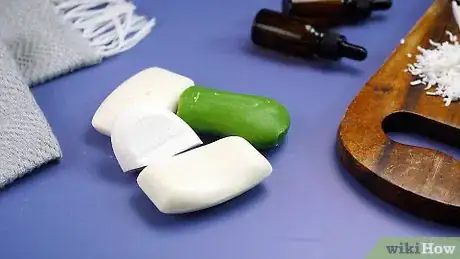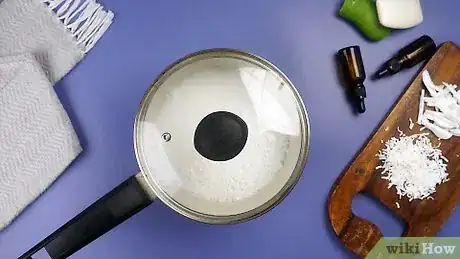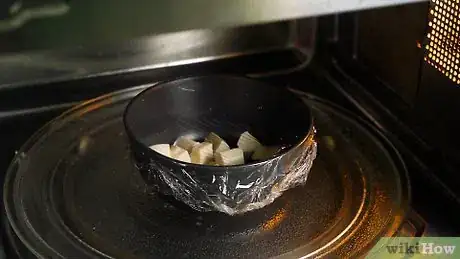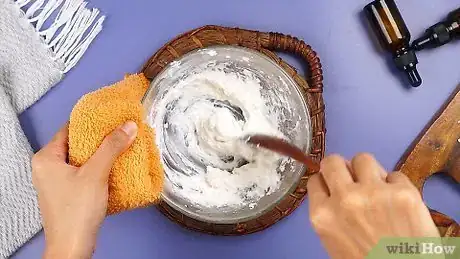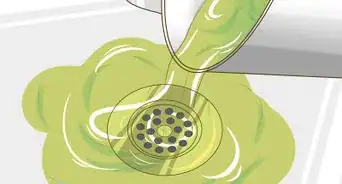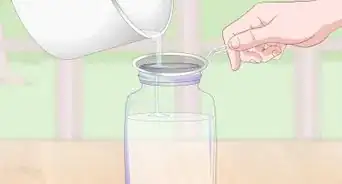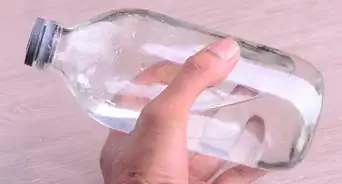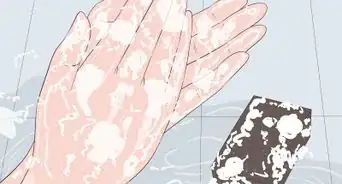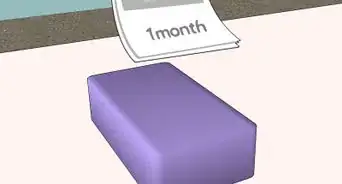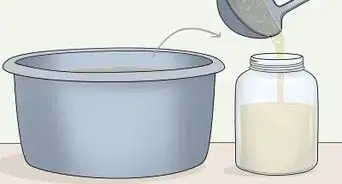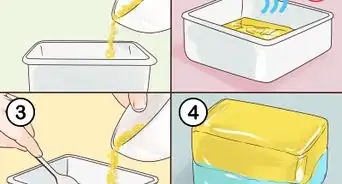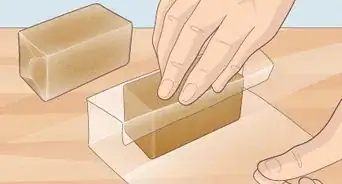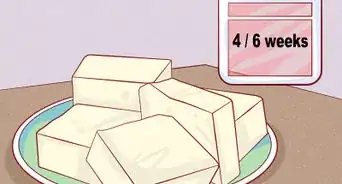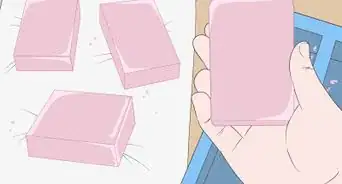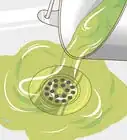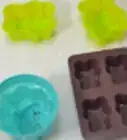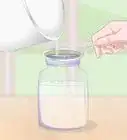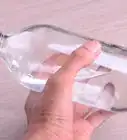This article was co-authored by wikiHow Staff. Our trained team of editors and researchers validate articles for accuracy and comprehensiveness. wikiHow's Content Management Team carefully monitors the work from our editorial staff to ensure that each article is backed by trusted research and meets our high quality standards.
wikiHow marks an article as reader-approved once it receives enough positive feedback. In this case, 90% of readers who voted found the article helpful, earning it our reader-approved status.
This article has been viewed 198,136 times.
Learn more...
There are so many things you can do with melted soap! It’s a great way to save money on liquid hand soaps and other toiletries. By melting down scraps of soap that would otherwise be thrown away, you can make your own cheap hand soap or body wash. With a few simple steps, you can have melted soap to use for any project you have in mind.
Steps
Liquefying Soap Scraps on the Stove
-
1Gather any scraps of old bar soap you can find. These should be equal to a weight of 4 ounces, which is the weight of an average bar of soap. You can also use an entire bar of soap, if you prefer. Any bar soap, whether whole or in pieces or scraps, will work. [1]
-
2Shred the soap using a cheese grater. A regular, four-sided standing metal cheese grater works perfectly, but a smaller hand-held cheese grater would also do the trick. The idea is to reduce larger pieces into smaller shreds that will be easier to melt. [2]
- A citrus zester or a potato peeler could also be used if you don’t have a cheese grater on hand.
Advertisement -
3Heat the soap pieces in a pot with 8-9 cups of water. In a large saucepan over low to medium heat, heat the soap pieces until melted. If you’re planning on making a creamy body wash instead of a liquid hand soap, use less water. The more water you use, the thinner the end product will be. [3]
- If you’re concerned about reusing your saucepan for cooking and possibly contaminating food with soap ingredients, you might want to designate an old pot just for melting soap, or pick up a cheap, used one at a thrift store.
-
4Remove the soap from the stove. Let it sit covered for 12-24 hours. The soap will thicken overnight. If the soap is not at the consistency you prefer, you can reheat it and make adjustments as necessary. [4]
- If you’re still not sure of the consistency, use a whisk or a blender to mix it together further.
Softening Soap in the Microwave
-
1Cut your soap base into cubes and put them into a glass bowl. Glassware is better than plasticware, as plastic may leech out any fragrance oil in your soap.
- If you’re planning on making bar soaps as your end project, weigh out the amount of soap in advance so that it matches the mold you’ll be using.
- If you’re unsure of how much your mold holds, fill it with water and then dump it into a measuring cup.
- It’s best to use ½ to 1 ounce more than what the mold holds. [5]
-
2Cover the glass bowl with plastic wrap and put it in the microwave. Covering the bowl helps to keep the moisture sealed inside. Heat your soap at 30 second intervals.
- It’s important not to overheat your soap base as it could ruin the integrity of the soap. [6]
-
3Stir the soap to ensure that it’s completely melted. Check for clumps of soap. If you find any, recover the soap and microwave for another 30 seconds. [7]
Melting Soap Using Boiling Water
-
1
-
2Fill a saucepan with water and bring it to a boil. A double boiler works well for this, if you have one. Otherwise, you can use a medium saucepan. [10]
-
3Put the soap shreds or cubes into a glass bowl. Place the bowl on top of the double boiler or saucepan. The heat from the boiling water will gradually begin to melt the soap.
- If you’re using goat milk soap, adding 1 tablespoon (14.8 ml) of water for every 2 cups of soap will help the soap scraps or pieces bind to each other. [11]
-
4Stir the soap every few minutes. Stir frequently enough that the pieces begin to melt into each other. However, stirring too frequently or too hard could cause bubbles. The best thing to do is just stir the soap every couple of minutes or so.
- If the soap shreds or pieces are not melting into each other, add 1 additional tablespoon of water at a time, up to 3 teaspoons. [12]
-
5Remove the soap from the heat when it looks mostly smooth. Note that the soap is unlikely to be completely, perfectly smooth. Some texture is expected. [13]
Community Q&A
Did you know you can get answers researched by wikiHow Staff?
Unlock staff-researched answers by supporting wikiHow
-
QuestionCan you melt Dove soap?
 wikiHow Staff EditorThis answer was written by one of our trained team of researchers who validated it for accuracy and comprehensiveness.
wikiHow Staff EditorThis answer was written by one of our trained team of researchers who validated it for accuracy and comprehensiveness.
Staff Answer wikiHow Staff EditorStaff AnswerYou can melt down Dove soap bars, but they behave differently from other types of bar soap because of the high moisturizer content. If you want to use the liquification method (putting shavings of soap directly into water), then you need to reduce the amount of water or increase the amount of soap to avoid getting a very watery result.
wikiHow Staff EditorStaff AnswerYou can melt down Dove soap bars, but they behave differently from other types of bar soap because of the high moisturizer content. If you want to use the liquification method (putting shavings of soap directly into water), then you need to reduce the amount of water or increase the amount of soap to avoid getting a very watery result. -
QuestionCan you melt down a bar of soap and then remold it?
 wikiHow Staff EditorThis answer was written by one of our trained team of researchers who validated it for accuracy and comprehensiveness.
wikiHow Staff EditorThis answer was written by one of our trained team of researchers who validated it for accuracy and comprehensiveness.
Staff Answer wikiHow Staff EditorStaff Answer
wikiHow Staff EditorStaff Answer -
QuestionIs it dangerous to microwave soap?
 wikiHow Staff EditorThis answer was written by one of our trained team of researchers who validated it for accuracy and comprehensiveness.
wikiHow Staff EditorThis answer was written by one of our trained team of researchers who validated it for accuracy and comprehensiveness.
Staff Answer wikiHow Staff EditorStaff Answer
wikiHow Staff EditorStaff Answer
References
- ↑ https://clark.com/family-lifestyle/make-liquid-hand-soap-bar-scraps/
- ↑ https://clark.com/family-lifestyle/make-liquid-hand-soap-bar-scraps/
- ↑ https://clark.com/family-lifestyle/make-liquid-hand-soap-bar-scraps/
- ↑ https://clark.com/family-lifestyle/make-liquid-hand-soap-bar-scraps/
- ↑ https://library.rusticescentuals.com/basic-melt-and-pour/
- ↑ https://library.rusticescentuals.com/basic-melt-and-pour/
- ↑ https://library.rusticescentuals.com/basic-melt-and-pour/
- ↑ https://clark.com/family-lifestyle/make-liquid-hand-soap-bar-scraps/
- ↑ https://library.rusticescentuals.com/basic-melt-and-pour/
- ↑ https://dontwastethecrumbs.com/2015/09/how-to-make-soap-from-soap-scraps/
- ↑ https://dontwastethecrumbs.com/2015/09/how-to-make-soap-from-soap-scraps/
- ↑ https://dontwastethecrumbs.com/2015/09/how-to-make-soap-from-soap-scraps/
- ↑ https://dontwastethecrumbs.com/2015/09/how-to-make-soap-from-soap-scraps/
About This Article
You can melt a soap bar or scraps a few different ways to mold new soap. To melt soap on the stove, first shred it with a cheese grater. Then, heat it in a pot with 8 cups of water over low or medium heat. When the soap’s all melted, turn the heat off, cover the pot, and leave it to sit for 12 to 24 hours. You can also melt soap in the microwave. Just cut it into small cubes in a glass bowl. Then, heat the soap for 30 seconds at a time in the microwave and stir it each time until it’s all melted. For more tips, including how to melt soap with a double boiler, read on!
